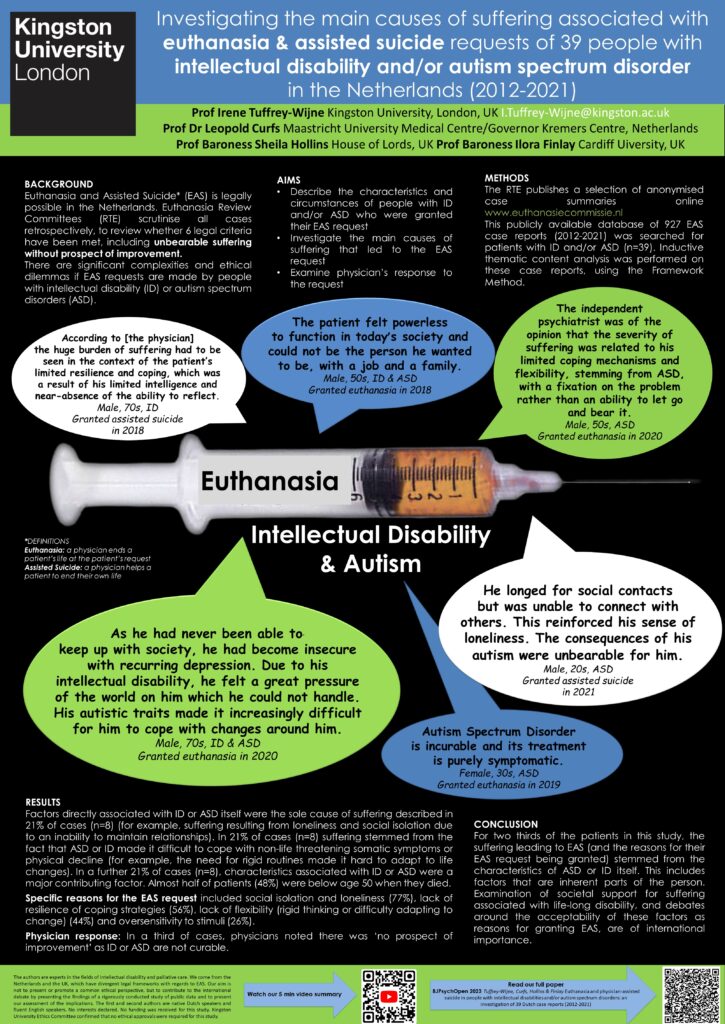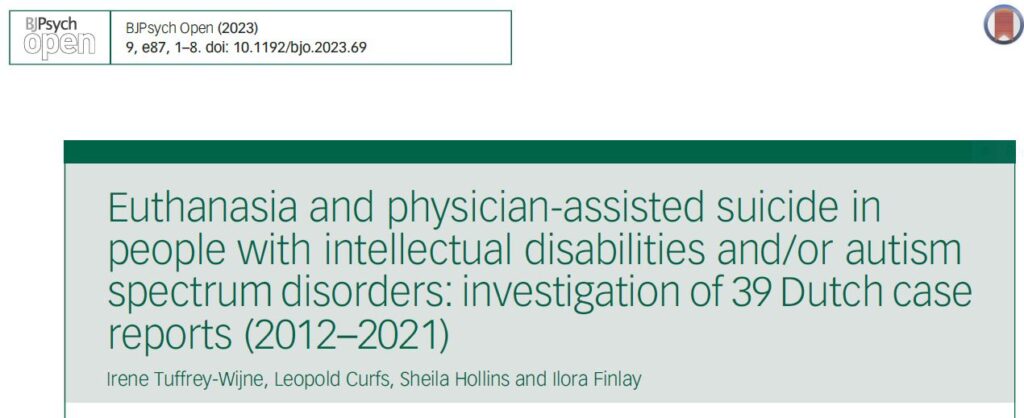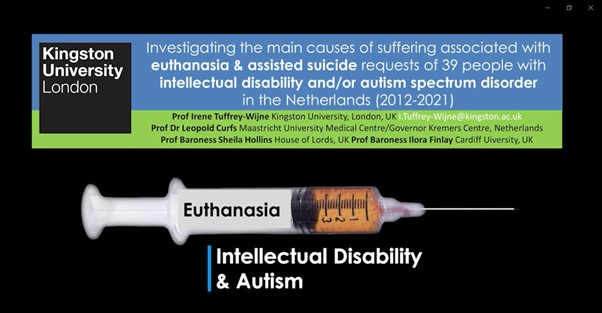I’d like you to imagine the following scenario.
You work in the health service, or perhaps in social care. You get a referral for a man in his 70s. He has an intellectual disability and he is autistic. He feels he is suffering so much, he cannot bear it. His doctor explains to you that this is because:
As he has never been able to keep up with society, he has become insecure, with recurring depression. Due to his intellectual disability, he feels a great pressure of the world on him which he can not handle. His autistic traits make it increasingly difficult for him to cope with changes around him.
This reminds you of another man you support, much younger, just in his 20s. He, too, is suffering, because (and this is, again, his doctor speaking):
The patient has felt unhappy since childhood and was persistently bullied because he was just a bit different from others… He longs for social contacts but is unable to connect with others. This reinforces his sense of loneliness. The consequences of his autism are unbearable for him.
What can you do? What can we all do, as professionals, as families and friends, as policy makers, as funders, as a society?
There is no doubt that some people suffer deeply and profoundly, that the support they need is complex, and that you may well feel helpless, because some of the things that would really help are beyond your influence. Societies are not level playing fields. Too often, there is not enough understanding, not enough room for difference, not enough support.
What these men needed, it seems to me, is a society where they feel they belong, with people around them who not just accept and accommodate, but welcome their unique ways of being.
What this needs is a huge culture shift, but also a significant investment in highly individualised support services.
You feel helpless because cultures take a very long time to shift, you cannot magically find friends for these men, and your services are under-resourced. So what is the answer here?
I haven’t made these scenarios up. These were real men. They lived in the Netherlands. They asked for euthanasia. In the Netherlands, lots of people (around 1 in 20) die through euthanasia. If you are suffering unbearably, and there is no prospect of improvement, this is an option.
Their doctors agreed that euthanasia was the only acceptable option left for them, because (they explained) “Autism Spectrum Disorder is incurable”, and so is intellectual disability, so there really was no prospect of improvement.
These are just two stories out of 39 Dutch cases we analysed. Thirty-nine people who had an intellectual disability, or who were autistic (or both), and who died through euthanasia (a doctor giving a fatal injection at the patient’s request) or assisted suicide (the patient taking a fatal drug, with a doctor’s help). We looked at what caused these people to suffer. What made them ask for death, and on what grounds did doctors agree to their request?
We found that for the majority of people (two thirds of cases), it was factors associated with the intellectual disability or autism itself, which led to their suffering, their request to die, and the doctors saying yes. Factors like the ones described above: social isolation, loneliness, not being able to cope with life or with changes, being oversensitive to stimuli.

Our paper on this study has just been published. Here is a summary poster. At the bottom of this blog post, you can find our full paper and a 5 minute summary video (click on the images below). Please share these widely, because we need to continue the debate on assisted dying.
What are YOUR thoughts?
These are the questions I am asking myself:
If you agree to an assisted death for people who are suffering because of their autism or their intellectual disability, are you really saying that being autistic or disabled is HOPELESS? That is the word used to justify these assisted deaths: hopeless. No prospect of improvement. It seems to me that this places the problem within the person themselves. But is it the “patient” who needs to change or improve?
Or is it society? How can we build societies where people do not feel lonely or overwhelmed?
I wonder whether the option of an assisted death in these cases helps to build such a society – or hinders it.



social isolation, loneliness, not being able to cope with life or changes – anyone suffering anxiety or depression can struggle with this and feel it is hopeless. The difference is the people around them don’t think it’s hopeless and work with them to find strategies to improve their life. Here the drs are judging that you cant make changes and I don’t agree they are factors associated with autism which is a cognitive processing style of autism. They are due to how society has treated them. The young person wants to have friends and has a Will to be included – this shouldn’t be considered a hopeless situation. This isn’t euthanasia it’s eugenics. At least the nazis were open about it..
Pingback: As we reflect on calls for euthenasia… | St Nicholas, Boldmere
The titel is misleading.
In fact, the reality is as follows: “Assisted to die, because psychiatry professionals do not bother to learn and to practice curing therapies of mental illnesses that exist.”
Bibliographies: https://esperances.org/bibliographie/